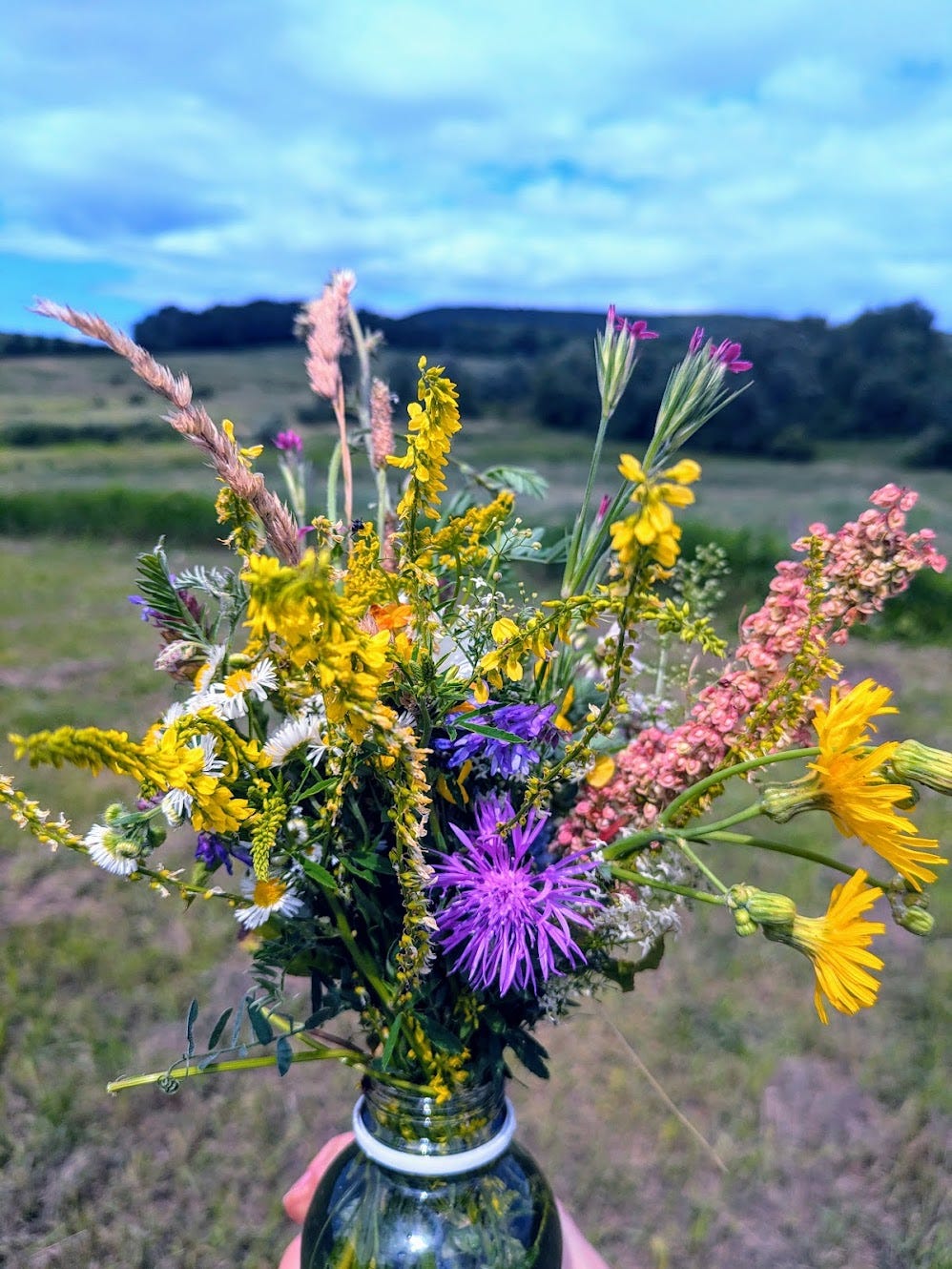Why You Should Be More Nostalgic
The surprising power of memory to remind us what we love enough to fight for
Soundtrack to this week: Main Roads, by Victoria Williams, covered by Lucinda Williams
Summer is the season of nostalgia. The heat calls up my Southern youth. Popsicles, bike rides, weeds sprinting through the cracks in the sidewalk; shouts echoing from a pool and the light that dances on the underside of the diving board.
On Sunday, we picked up our youngest from her first time away at summer camp, and I realized…
I’m no longer just nostalgic for my own childhood. I’m old enough to be nostalgic also for my children’s tiny, squishy years. The other day a friend sent me a photo that popped up in her “memories” of my now-twelve year old asleep in the carseat, skin a little waxy in the heat, empty bottle clutched to her chest and milk ringing her lips. Heartrending. Unfair.
I anticipate this feeling will keep doubling up and shifting, like pleating the fabric of a napkin between my fingers. The wrinkles in time.
The political and ecological storms of the moment are also giving me those throwback feels. We spent this Fourth of July on the beach with really dear friends. Back in June of 2020, we formed a temporary bubble with them in this same town, at their little cottage. The spectrum of feelings was so similar; sweetness, belonging, relief, laughter, foreboding, anger, despair, guilt at enjoying this respite when others are suffering. And now, nostalgia.
Am I really feeling nostalgia for the plague? No, no, of course not, but I do miss that moment, early on, when people were caring for each other, when the government was sending out checks, when we were applauding essential workers on our doorstep each night, and attending the vigil in McCarren Park, in Brooklyn, where people gathered to observe eight minutes and forty-six seconds of silence, because that’s how long Derek Chauvin had his knee on George Floyd’s neck; they kept it up for over a year.
Politically, nostalgia gets a bad rap. It’s associated with conservatism, axiomatically. I think of the toxicity of “tradwives,” not to mention the Gone With The Wind, hoop-skirt bullshit endemic to my Louisiana childhood.
I bite back the nostalgia when it comes to parenting, also. I believe, fiercely, that our kids don’t need to hold onto our sadness about who they no longer are. They are engaged in being and becoming, and as they climb, it’s up to us to cheer and salute each stage. In particular, this holds true for my child at the doorstep of adolescence. I don’t want to miss the beauty of who they are now because I’m retreading the past. I mist up in private.
But two pieces of scholarship I read recently suggest that when it comes to the climate crisis, nostalgia may have a purpose.
In a recent paper with the lovely title “One Day When We Were Young: Nostalgia Brings Climate Change Temporally Closer,” three Chinese researchers found:
nostalgia increases climate engagement by reducing temporal distance;
vivid imagery is a mechanism for these nostalgic effects;
nostalgic public service announcements increase climate engagement more than non-nostalgic ones.
Here’s a vivid image for you: The house where I lived until age nine was across the street from an empty field. I remember taking lawn chairs over there with my neighbors on summer nights. We made a hushed and expectant audience for the cloud of fireflies that emerged like Balanchine fairies from the trees at the back.
Today, fireflies seem to be in decline, although they are surprisingly understudied and underprotected, given how charismatic an insect they are.
It’s the glow of our memories that may be able to counteract the phenomenon of shifting baseline: the heartbreaking tendency to continously accept the process of environmental degradation, because we forget how beautiful and teeming things used to be.
Jason Lambacher, a political scientist at the University of Washington Bothell, writes:
As ecological nostalgia becomes a widespread counterpoint to 21st century change, it should be given greater critical attention by environmental political theorists looking to understand the productive potential of an overlooked and oft-derided emotional and cultural construct.
Can it aid what Schlosberg calls a “politics of sight” and allow us to see, and maybe more importantly feel, what otherwise wouldn’t register clearly? Can the homesickness that accompanies nostalgia encourage commitments to acts of restoration, repair, and care for the world, for both individuals and collectivities alike?
I love the phrase “politics of sight.” Lambacher elaborated in an email to me: “Emotions are a foundation for action, more so than intellectual commitments for most people, so ecological nostalgia can be about not just lamenting what is gone or threatened, but harnessed to help people defend what they care about.”
I can’t bring back the past. But I can let my feelings for the past affirm and inform my care and love for the people, creatures, places, experiences that are available to me now, in the present.
Links
So grateful to have been invited to chat with the wise
on her podcast.Every year, botanists around the world discover around 2,000 new plants
“Everything is possible and everything is imaginable,”
Come see me this weekend!
Come see me on Friday at the Patagonia Soho Store, and on Saturday at the Wheel of Climate Emotions event on Governor’s Island.








Particularly beautiful this week, Anya.✨🩷